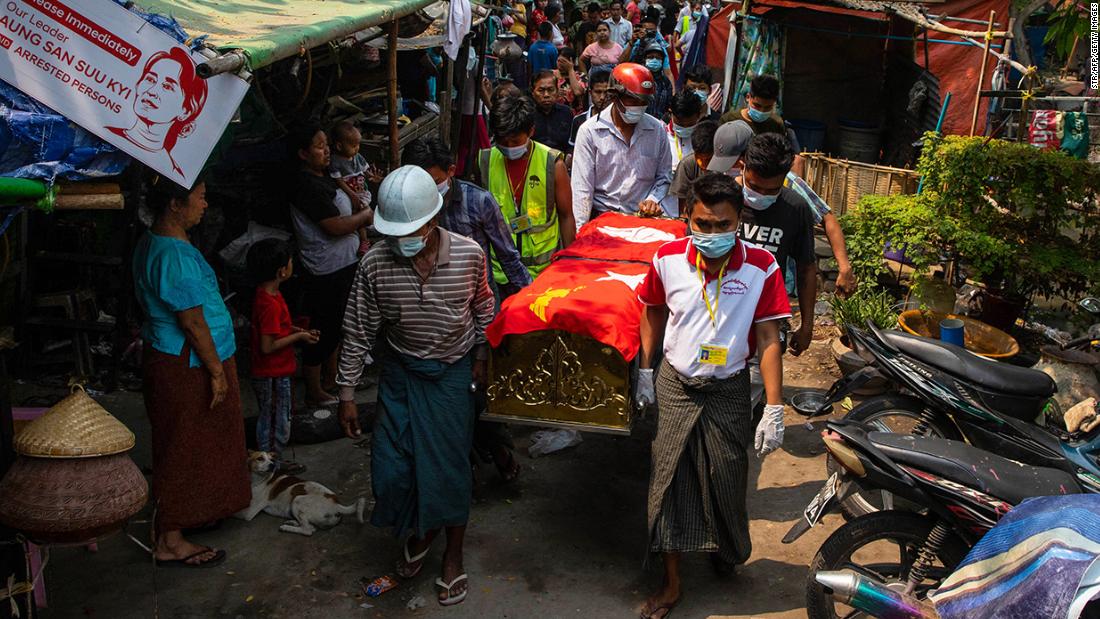Here’s what you need to know about the situation.
Why did the Myanmar military take power?
The military justified its acquisition on the grounds of widespread electoral fraud during the November 2020 general elections, which gave Suu Kyi’s party another overwhelming victory.
The Union Solidarity and Development Party (USDP) performed poorly in the vote, destroying the hopes of some of its military supporters that it could take power democratically – or at least choose the next president. The military then claimed – without providing any evidence – that there were more than 10.5 million cases of “potential fraud, such as non-existent voters” and asked the electoral commission to publicly release the final voting data.
The commission rejected allegations of electoral fraud.
It was only the second democratic vote since the previous junta initiated a series of reforms in 2011, after half a century of brutal military rule that plunged Myanmar, formerly known as Burma, into poverty and isolationism.
Why is Myanmar protesting?
The demonstrations, especially those taking positions on the front line behind barricades, are dominated by young people who have grown up with a level of democracy and political and economic freedoms that their parents or grandparents did not have, which they do not want to give up.
Meanwhile, a civil disobedience movement has seen thousands of workers, from doctors, bankers and lawyers to teachers, engineers and workers, quitting their jobs as a form of resistance to the coup.
How are the military responding?
In recent weeks, the military has intensified its response to the protests. Filming and images on social media show bodies crushed in pools of blood on the streets and young protesters dressed in fragile plastic helmets crouched down to protect themselves from police bullets behind makeshift shields.
Amnesty International said the military is using increasingly lethal tactics and weapons normally seen on the battlefield against peaceful protesters and passers-by. Battle-hardened soldiers – documented for having committed human rights abuses in conflict areas – have been sent to the streets, Amnesty said. The UN Special Rapporteur on Human Rights in Myanmar, Tom Andrews, said the military’s “brutal response” to peaceful protests “is probably reaching the legal limit for crimes against humanity”.
Under cover of a nighttime Internet blackout, security forces go from door to door in nightly attacks, taking people out of their homes. Many of those detained arbitrarily are kept out of contact with family and friends, their conditions or whereabouts are unknown.
At least four of the deaths in the past few days were from individuals arrested and detained by the junta, including two deposed NLD party officials. All four died in custody, according to the Office of the UN High Commissioner for Human Rights. Family groups and activists claimed that the two NLD officials were tortured.
Despite the danger, thousands of young protesters continued to challenge the military and took to the streets every day, and local reporters and citizen journalists continue to risk their lives by broadcasting live and documenting the repression.
“The MPF is doing its job in accordance with democratic practices and the measures it is taking are even smoother than in other countries,” he said.
What happened to Aung San Suu Kyi?
Suu Kyi was once celebrated as an icon of international democracy. A former political prisoner, she spent 15 years under house arrest as part of a decades-long struggle against the military regime.
His release in 2010 and his electoral victory five years later were praised by Western governments as significant moments in the country’s transition to a democratic regime, after 50 years of military regimes.
Suu Kyi has not been seen by the public or her lawyers since she was arrested. Deposed President Win Myint has also been detained since the coup and faces similar charges.
Ruling NLD officials have been arrested or hid since the coup. A group of former NLD lawmakers have formed a kind of parallel civil parliament – called the Pyidaungsu Hluttaw Representative Committee (CRPH) – and are pushing for international recognition as the legitimate government.
What is the UN doing?
Protesters, activists and civilians called on the international community to intervene and protect the Burmese people from military attacks.
China has not openly condemned the military takeover, but in comments following the Security Council agreement, UN Ambassador Zhang Jun said that “it is important for Council members to speak with one voice. We hope that the Council’s message is conducive to to alleviate the situation in Myanmar. “
After the fire at Chinese factories in Yangon this week, China took on a more aggressive tone. The Chinese Embassy in Myanmar said that “China urges Myanmar to take more effective measures to prevent all acts of violence, to punish perpetrators according to the law and to ensure the safety of the life and property of Chinese companies and employees in Myanmar. “, according to the state broadcaster CGTN.
Many in Myanmar are becoming frustrated by mere words of condemnation and are calling for more meaningful action.
A group of 137 non-governmental organizations from 31 countries called on the UN Security Council to urgently impose a global arms embargo on Myanmar.
Andrews, the UN special rapporteur for human rights in Myanmar, called on member states “to deny the military junta’s recognition as a legitimate government”. He also called for an end to the flow of revenue and weapons to the junta, saying multilateral sanctions “should be imposed” on leaders, military-owned and controlled companies and the state-owned energy company, Myanmar Oil and Gas Enterprise.
